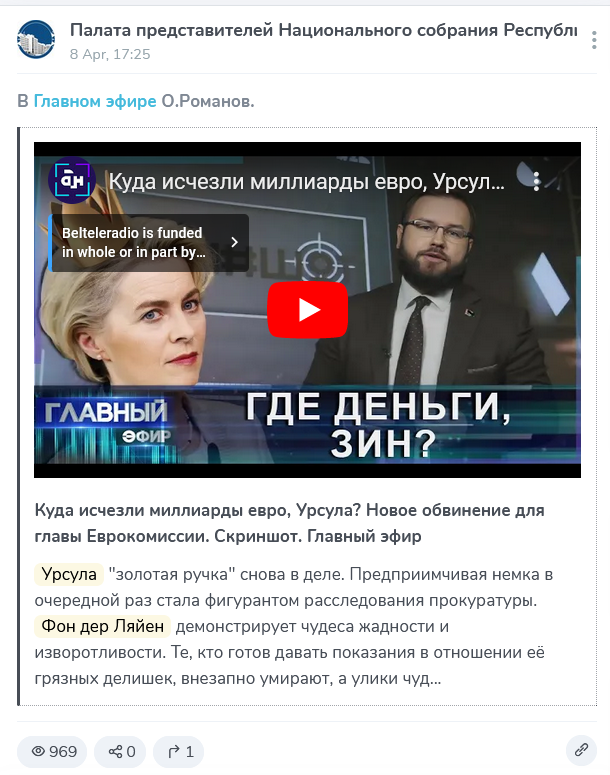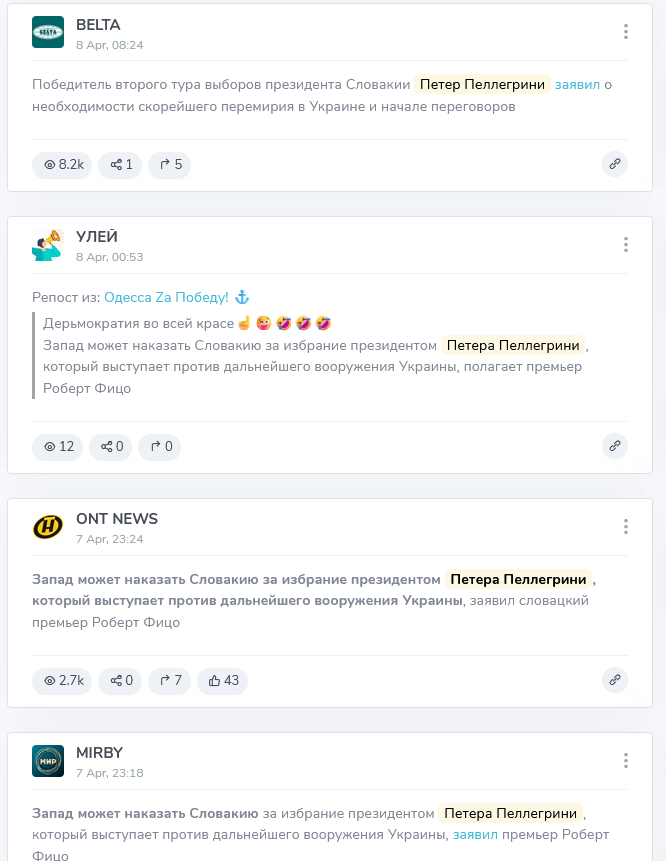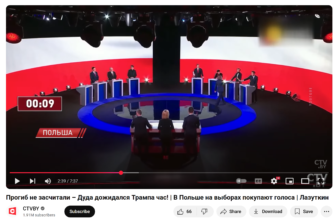Observation period April 8-14, 2024.
We are starting to test the new format of Fact-Checking Frontier, based on daily publications of the EU Elections Disinfo Bulletin and monitoring Belarusian Telegram channels and public chats.
A false story about Ursula von der Leyen, President of the European Commission, being part of a family with Nazi ties. Recent online claims state that the President of the European Commission has familial connections to Nazi officials. This unfounded information has circulated before but has gained traction again in recent weeks. These allegations were recently debunked by numerous fact-checking organizations, finding no evidence of such heritage. These false stories align with disinformation narratives attempting to portray EU institutions and their representatives as anti-democratic.
In Belarusian Telegram channels and public chats, we found about 500 posts from January 1 to April 8, 2024.

It turned out that Belarusian propaganda channels prepared a couple of publications in April, including material on ATN, about accusations of corruption against Ursula von der Leyen and the pharmaceutical company Pfizer.
Pay attention to the visualization:

The phrase “Where’s the money, Zin?” is a fragment of a song by Vladimir Vysotsky, created in 1972-1973, which gained a “second life” after being quoted by the leader of the Russian Federation, V. Putin.
“The Dagestanis are not a particularly wealthy people, and they live with difficulties, but the payment collection rate is 90%, including from the population. But the money doesn’t come in. A very reasonable question arises: ‘Where’s the money, Zin?’,” said Putin.
It can be assumed that the target audience of these memes used by Belarusian propagandists is older people who might feel some nostalgic sentiments towards the Soviet Union.
The repost shown was made by the Telegram account of the House of Representatives of the National Assembly of the Republic of Belarus, which can be partly considered the official position of the Belarusian parliament, unrecognized by the European Union.
Disinformation about the Presidential Elections in Slovakia
The final round of the presidential elections in Slovakia, held last weekend, was marked by rampant disinformation and various attempts to discredit the two candidates, Ivan Korčok and Peter Pellegrini, even using deepfake videos. According to local fact-checking organizations and NGOs, the debates were heavily tainted by Russian propaganda, and Pellegrini’s victory may have been aided by a campaign based on false narratives. Other false stories suggest alleged vote rigging in the first round, particularly targeting Korčok.
Belarusian pro-government Telegram channels greeted Pellegrini’s victory with discourse about punishing Slovakia for its suspicious stance on the invasion of Ukraine:

Initial comments sounded somewhat different:
A supporter of an early resolution to the conflict in Ukraine and an opponent of supplying weapons to this country, Peter Pellegrini was elected President of Slovakia. After his victory, Pellegrini stated that he would do everything to ensure that his country “always stands for peace, not war.”
Thus, the campaign was subsequently built on the theme of “punishing” Slovakia for the position of its current leaders.
A Surge of Anti-Ukrainian Disinformation Ahead of EU Parliament Elections
With the European Parliament elections on the horizon, and support for Ukraine being one of the key issues at stake, disinformation campaigns conducted by pro-Russian actors are intensifying, warn fact-checkers and experts from various countries. Using false stories, these efforts aim to portray Ukrainian refugees as criminals or unfairly privileged compared to local citizens, as well as falsely accusing Ukrainian officials of embezzling Western aid – two of the most common pro-Russian disinformation narratives. Experts warn that the spread of these false stories appears to be strategically aimed at undermining EU support for Ukraine and bolstering far-right and nationalist parties by leveraging anti-immigrant and anti-European sentiments. Similar false stories have been spread in Germany, the Czech Republic, Hungary, Italy, Spain, the Netherlands, Belgium, Austria, and other EU countries.










Comments are closed.